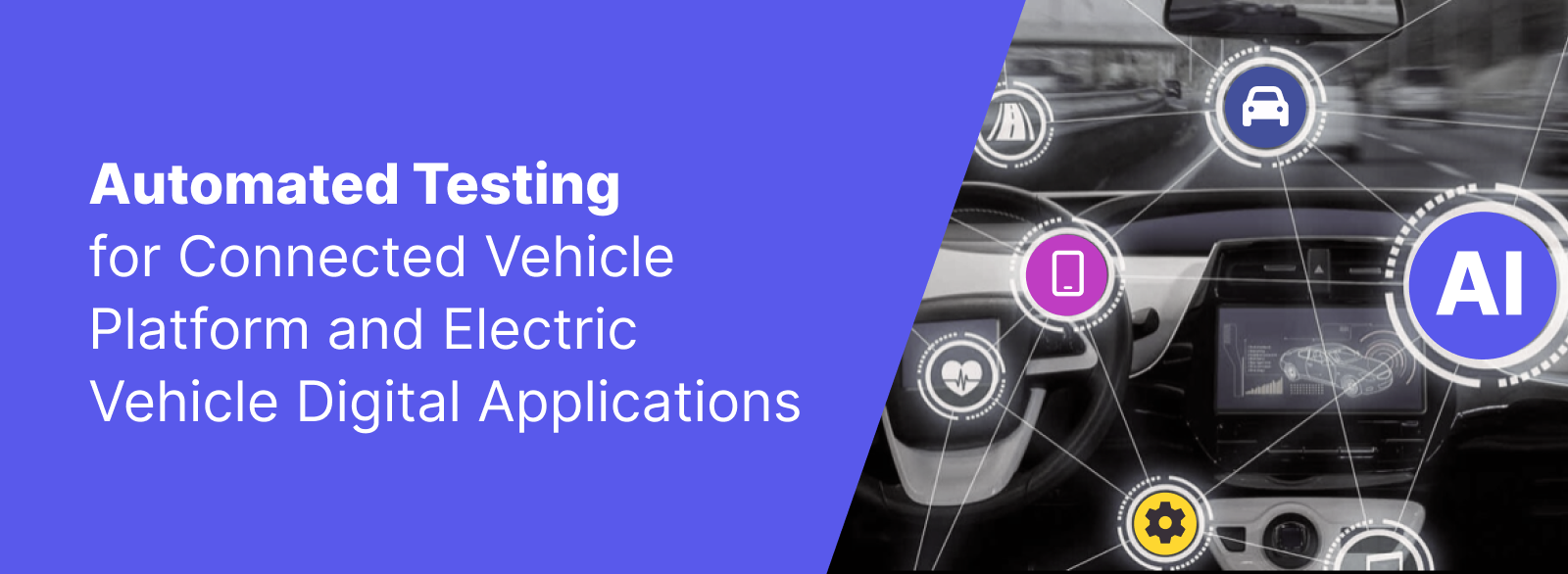How Katalon and QualityKiosk Automated Testing for Connected Vehicle Platform and Electric Vehicle Digital Applications
Learn with AI

Introduction
The customer is a leading global car manufacturer headquartered in India, dedicated to providing high-quality passenger cars, trucks, vans, coaches, and buses to customers worldwide. With over 100+ web, mobile, and IOS apps in its portfolio, the Company faced significant challenges in managing and testing its vast array of applications due to frequent releases and tool stack dependencies.
To overcome quality testing challenges, the Company is moving towards automation and DevOps, streamlining its testing processes to improve efficiency and quality. By creating a centralized testing approach, the company aims to ensure consistency and quality across all its apps and processes.
Through its partnership with QualityKiosk, the Company was able to centralize and streamline its testing process, ensuring consistency and quality across all its apps and processes. With the use of Katalon, the Company was able to quickly create and execute automated tests, reducing manual testing efforts and improving overall productivity.
Project Scope
The project scope involved automating testing for around 40+ applications across various platforms, including web and mobile, with changes coming in frequently. The testing covered staging and production environments. Each application had an average of 10-12 modules, and there were over 500 regression test cases for each app.
The project aimed to streamline testing processes for all these applications and ensure they are thoroughly tested before release. The automation of testing for these applications was imperative to help reduce the time and effort required for manual testing, leading to faster time-to-market, improved quality, and increased efficiency.
The Challenge
The Company faced a significant business challenge in managing around 100+ apps, including web, mobile, and iOS applications. The complexity arose due to frequent releases and tool stack dependencies, which made testing and managing these apps difficult. Each application or process had its own development and testing, resulting in various practices being followed throughout the organization. This diversity in practices led to inconsistencies and inefficiencies in testing processes.
The technical challenges that led the Company to explore automation and orchestration included issues found in various applications in production and high cycle time during regression testing. With more applications being responsible for high-revenue production, automation became necessary to reduce production issues and improve efficiency in testing processes. By adopting automation and DevOps practices, the Company aimed to achieve faster time-to-market and improved app quality, helping it remain competitive in the industry.
Read more: Rethinking Test Automation To Address Business Challenges
The Solution
The Company recognized the need to centralize and streamline testing processes for its various apps and processes to address the challenges. This initiative set the Company apart from other organizations in the industry that continue to use different practices for testing and DevOps across various apps.
QualityKiosk played a crucial role in introducing the Katalon platform to the Company. The platform proved to be the ideal solution for the Company in automating its legacy applications in Sibel and web browsers, which were previously automated using Selenium. While automation with Selenium was possible, it required a high level of technical expertise, and script maintenance took a significant amount of time.
The Company required a powerful and robust testing automation tool that could support web and mobile testing with minimal coding and be easy for business users to understand. Katalon met these requirements and enabled the Company to reduce the time and effort required for script maintenance, leading to faster automation. Additionally, the Katalon platform provided robust features that made it easier for the Company's teams to automate their testing processes.
The Katalon platform offered several benefits to alleviate the challenges the Company faced:
- Cross-platform testing: Katalon's test collection enabled concurrent execution of several channels, such as web and mobile, enhancing software reliability and maximizing testing efficiency.
- Reusable test cases: Katalon allowed for test cases to be utilized across various test suites, and it also supported reusable keywords to improve efficiency and reduce maintenance time.
- DevOps integration: Katalon's DevOps integration was easy to achieve and manage using Katalon TestOps, which was integrated with Jenkins and Github. This integration enabled seamless collaboration between development and operations teams.
Outcomes
With a focus on basic and crucial features of the applications considered as sanity and regression suites, the use of the Katalon platform has delivered multiple benefits ranging from time-savings, to increased ROI, and enhanced team efficiency:
- The use of record and playback and advanced scripting modes for developing test scripts has saved the organization approximately 10 man-days since the implementation.
- The Katalon platform has resulted in a 40-50% reduction in testing time by enabling non-automation background testers to create and execute tests.
- Cost savings have been realized in terms of 3 full-time resources due to automation, allowing these team members to focus their efforts on enhancing the quality the products.
- Risk mitigation, with a reduction in production defects and cycle time for testing.
In one project, Katalon saved over 72 hours of manual effort for each release via automation, reducing it to around 12 hours, thereby accelerating the Company’s ability to deliver on its mission.
From a DevOps perspective, Katalon's key benefit takeaway is its seamless integration with GitHub and Jenkins for CI/CD, which due to Katalon’s native integrations, are easy to implement with minimal effort.
Conclusion
In partnership with QualityKiosk, the Katalon platform has enabled the Company to streamline its testing processes, reduce the time and effort required for manual testing, and improve efficiency, leading to significant cost savings and a better ROI. It has also enabled non-automation background testers and developers to contribute effectively to the testing process. Katalon has improved the Company’s ability to deliver on its mission and enabled it to achieve its business objectives more efficiently.
|

